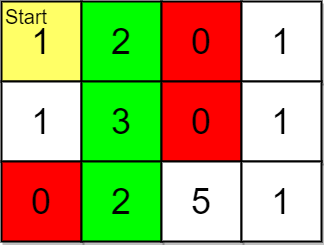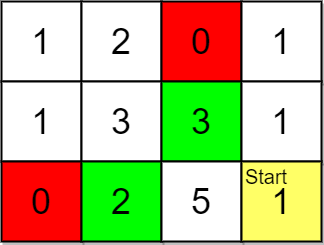LeetCode in Kotlin
2146. K Highest Ranked Items Within a Price Range
Medium
You are given a 0-indexed 2D integer array grid of size m x n that represents a map of the items in a shop. The integers in the grid represent the following:
0represents a wall that you cannot pass through.1represents an empty cell that you can freely move to and from.- All other positive integers represent the price of an item in that cell. You may also freely move to and from these item cells.
It takes 1 step to travel between adjacent grid cells.
You are also given integer arrays pricing and start where pricing = [low, high] and start = [row, col] indicates that you start at the position (row, col) and are interested only in items with a price in the range of [low, high] (inclusive). You are further given an integer k.
You are interested in the positions of the k highest-ranked items whose prices are within the given price range. The rank is determined by the first of these criteria that is different:
- Distance, defined as the length of the shortest path from the
start(shorter distance has a higher rank). - Price (lower price has a higher rank, but it must be in the price range).
- The row number (smaller row number has a higher rank).
- The column number (smaller column number has a higher rank).
Return the k highest-ranked items within the price range sorted by their rank (highest to lowest). If there are fewer than k reachable items within the price range, return all of them.
Example 1:

Input: grid = [[1,2,0,1],[1,3,0,1],[0,2,5,1]], pricing = [2,5], start = [0,0], k = 3
Output: [[0,1],[1,1],[2,1]]
Explanation: You start at (0,0).
With a price range of [2,5], we can take items from (0,1), (1,1), (2,1) and (2,2).
The ranks of these items are:
-
(0,1) with distance 1
-
(1,1) with distance 2
-
(2,1) with distance 3
-
(2,2) with distance 4
Thus, the 3 highest ranked items in the price range are (0,1), (1,1), and (2,1).
Example 2:

Input: grid = [[1,2,0,1],[1,3,3,1],[0,2,5,1]], pricing = [2,3], start = [2,3], k = 2
Output: [[2,1],[1,2]]
Explanation: You start at (2,3).
With a price range of [2,3], we can take items from (0,1), (1,1), (1,2) and (2,1).
The ranks of these items are:
-
(2,1) with distance 2, price 2
-
(1,2) with distance 2, price 3
-
(1,1) with distance 3
-
(0,1) with distance 4
Thus, the 2 highest ranked items in the price range are (2,1) and (1,2).
Example 3:

Input: grid = [[1,1,1],[0,0,1],[2,3,4]], pricing = [2,3], start = [0,0], k = 3
Output: [[2,1],[2,0]]
Explanation: You start at (0,0).
With a price range of [2,3], we can take items from (2,0) and (2,1).
The ranks of these items are:
-
(2,1) with distance 5
-
(2,0) with distance 6
Thus, the 2 highest ranked items in the price range are (2,1) and (2,0).
Note that k = 3 but there are only 2 reachable items within the price range.
Constraints:
m == grid.lengthn == grid[i].length1 <= m, n <= 1051 <= m * n <= 1050 <= grid[i][j] <= 105pricing.length == 22 <= low <= high <= 105start.length == 20 <= row <= m - 10 <= col <= n - 1grid[row][col] > 01 <= k <= m * n
Solution
import java.util.ArrayDeque
import java.util.Collections
import java.util.Deque
class Solution {
fun highestRankedKItems(grid: Array<IntArray>, pricing: IntArray, start: IntArray, k: Int): List<List<Int>> {
val m = grid.size
val n = grid[0].size
val row = start[0]
val col = start[1]
val low = pricing[0]
val high = pricing[1]
val items: MutableList<IntArray> = ArrayList()
if (grid[row][col] in low..high) items.add(intArrayOf(0, grid[row][col], row, col))
grid[row][col] = 0
val q: Deque<IntArray> = ArrayDeque()
q.offer(intArrayOf(row, col, 0))
val dirs = intArrayOf(-1, 0, 1, 0, -1)
while (q.isNotEmpty()) {
val p = q.poll()
val i = p[0]
val j = p[1]
val d = p[2]
for (l in 0..3) {
val x = i + dirs[l]
val y = j + dirs[l + 1]
if (x in 0 until m && y >= 0 && y < n && grid[x][y] > 0) {
if (grid[x][y] in low..high) {
items.add(intArrayOf(d + 1, grid[x][y], x, y))
}
grid[x][y] = 0
q.offer(intArrayOf(x, y, d + 1))
}
}
}
Collections.sort(items) { a: IntArray, b: IntArray ->
if (a[0] != b[0]) return@sort a[0] - b[0]
if (a[1] != b[1]) return@sort a[1] - b[1]
if (a[2] != b[2]) return@sort a[2] - b[2]
a[3] - b[3]
}
val ans: MutableList<List<Int>> = ArrayList()
var i = 0
while (i < items.size && i < k) {
val p = items[i]
ans.add(listOf(p[2], p[3]))
++i
}
return ans
}
}

